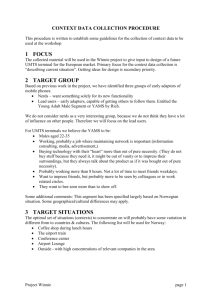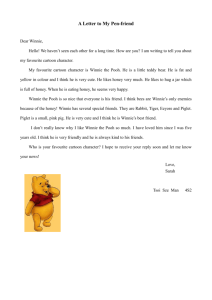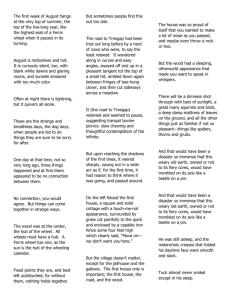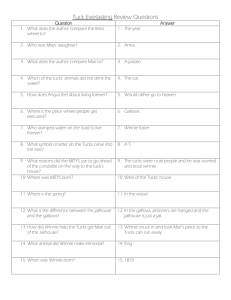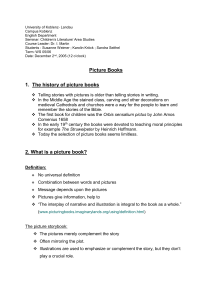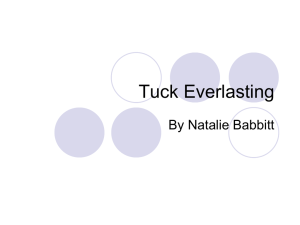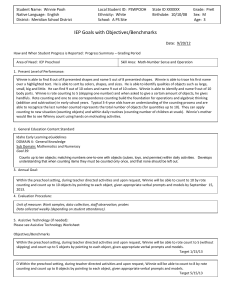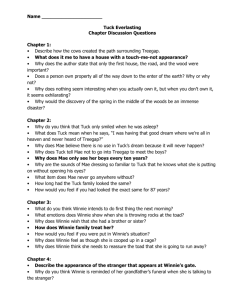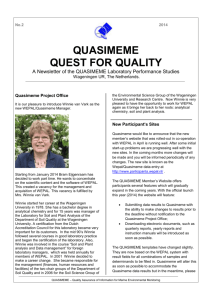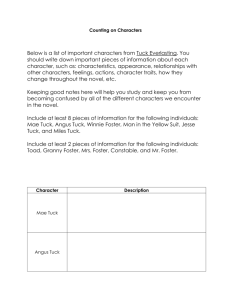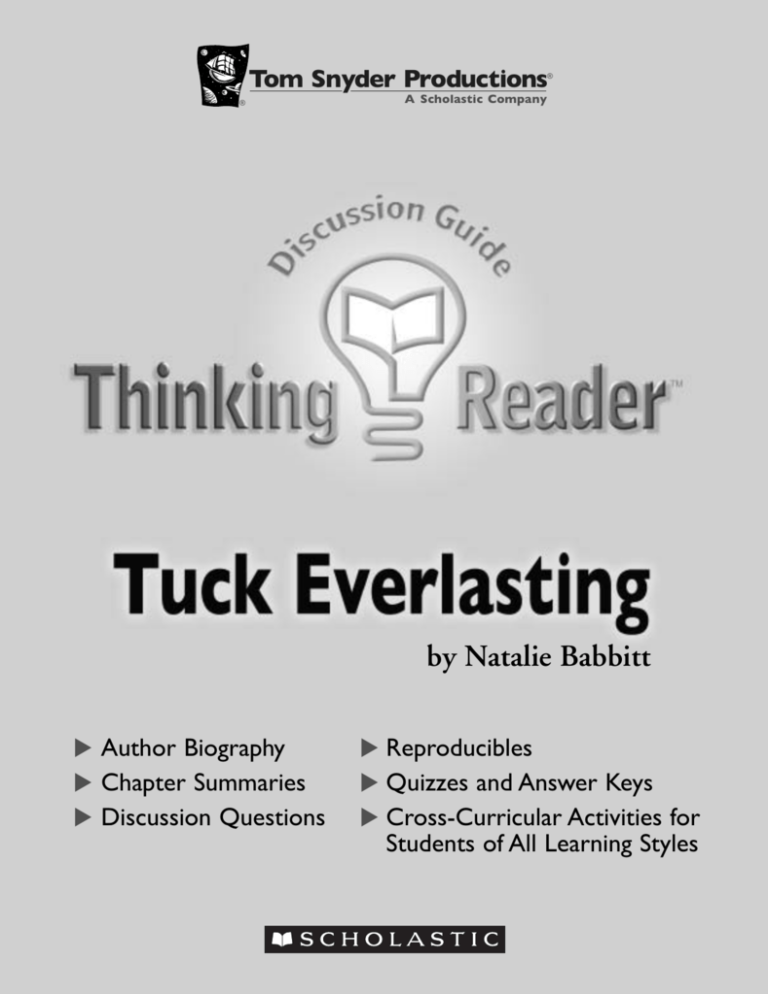
®
Tom Snyder Productions
A Scholastic Company
®
by Natalie Babbitt
u Author Biography
u Reproducibles
u Discussion Questions
u Cross-Curricular Activities for
u Chapter Summaries
u Quizzes and Answer Keys
Students of All Learning Styles
Copyright and Trademark Notice
Copyright © 1997 by Scholastic, Inc. Used by permission.
Pages 14–25 © 2004 by Tom Snyder Productions, Inc.
Thinking Reader and associated designs are trademarks of Scholastic, Inc.
Scholastic and associated logos and designs are trademarks and/or registered trademarks of Scholastic, Inc.
Portions of this guide were previously published in Scholastic Literature Guide, Grades 4–8: Tuck Everlasting
by Natalie Babbitt by Linda Ward Beech. Published by Scholastic Professional Books, a division of Scholastic Inc.
Author photo by Avi. Used by permission.
No part of this publication may be reproduced in whole or in part, or stored in a retrieval system,
or transmitted in any form or by any means, electronic, mechanical, photocopying, recording, or otherwise,
without written permission of the publisher. For information regarding permission, write to
Scholastic Inc., 557 Broadway, New York, NY 10012.
All rights reserved. Published by Tom Snyder Productions, Inc., a Scholastic Company.
For more information about Tom Snyder Productions products or professional development services,
please call us at
800-342-0236 or visit us at www.tomsnyder.com
Before Reading the Book
Table of Contents
Summary......................................................................................................................2
About the Author..........................................................................................................3
Literature Connections ................................................................................................3
Notes About Fantasy ..................................................................................................3
Getting Started ............................................................................................................4
Exploring the Book
Chapters 1–9
What Happens ............................................................................................................5
Questions to Talk About ..............................................................................................5
Cross-Curricular Activities: Language Arts, Art, Science ............................................6
Chapters 10–19
What Happens ............................................................................................................7
Questions to Talk About ..............................................................................................7
Cross-Curricular Activities: Writing, Science ................................................................8
Chapters 20–Epilogue
What Happens ............................................................................................................9
Questions to Talk About ..............................................................................................9
Cross-Curricular Activities: Social Studies, Writing ....................................................10
Summarizing the Book
Student Reproducibles
Class, Group, Partner, & Individual Projects ..............................................................11
And Then ....................................................................................................................12
Where Do You Stand? ................................................................................................13
Quizzes & Answers
Quiz 1 (Chapters 1–5) ................................................................................................14
Quiz 2 (Chapters 6–10) ..............................................................................................16
Quiz 3 (Chapters 11–15) ............................................................................................18
Quiz 4 (Chapters 16–20) ............................................................................................20
Quiz 5 (Chapters 21–25) ............................................................................................22
Answer Key ................................................................................................................24
Summary
Before Reading the Book
On a lazy summer day, 10-year-old Winnie Foster battles boredom
by taking a walk in the wood that her family
owns near Treegap. There, she
sees Jesse Tuck drinking from a
spring. When Winnie tries to
drink from it too, Jesse stops
her. Soon after, he, his brother
Miles, and mother Mae kidnap
Winnie and take her to their
home. Winnie soon learns the
story of the Tucks who have all
drunk from the spring and are
now ageless; they will never
die. The Tucks try to make
Winnie understand how
terrible it would be if
others found out about
their secret. Angus Tuck,
especially, seems saddened
and burdened by the
family’s plight. Meanwhile,
unknown to Winnie and the
Tucks, a stranger in a yellow suit has followed them, stolen their horse, and reported
Winnie’s whereabouts to her family. The stranger blackmails Winnie’s parents; in return
for the wood, he will save Winnie and bring her home. When the man returns to the
Tucks bragging about his plans for the spring water, Mae kills him. The constable puts
her in jail, but Winnie and the other Tucks manage to rescue her. They know that if Mae
is hung from the gallows, she won’t die. Jesse gives Winnie a bottle of water from the
spring and asks her to drink it when she is 17 so that they can be married and live
together forever. Although she loves Jesse, Winnie pours the water on a toad that she
has befriended. Years later, Mae and Angus Tuck return to Treegap and find Winnie’s
grave in the cemetery.
2
About the Author
Natalie Babbitt grew up wanting to be a writer and an
illustrator and has fulfilled this childhood dream. The first
book she illustrated was written by her husband and called
The Forty-Ninth Magician. Her first novel was The Search for
Delicious, which she describes as a “complicated fairy tale.”
Many of Babbitt’s other books are also fantasies set in the
past. She works hard at using accurate descriptions in her
books. For example, when writing The Eyes of the Amaryllis,
a book set in nineteenth-century Cape Cod, Babbitt did a lot
of research on hurricanes which play an important role in the story. She also consulted
tide charts of the period. To Babbitt, writing is “hard, hard work.” She advocates ceaseless reading for those who aspire to such a career.
Literature Connections
Other books by Natalie Babbitt include:
•
•
•
•
•
The Search for Delicious
Kneeknock Rose
Goody Hall
The Devil’s Storybook
The Eyes of the Amaryllis
Notes About Fantasy
Discuss with the class the difference between a fantasy and a realistic novel. Mention
other examples of fantasies, including fairy tales with which students are familiar. Point
out that magic is an important component of many fantasies. Encourage students to
list possible characteristics of a fantasy in their writing journals and to consult these as
they read Tuck Everlasting.
3
Getting Started
You might use one or more of these
suggestions to introduce the book to
the class:
• Discuss the different reasons
that people have secrets.
Talk about how certain
information can sometimes
be harmful to people. Tell
students that a secret is at
the centerpiece of the book.
• Ask students what they think
of when they hear the word
“everlasting.” Note their
responses, then point out that
this word is used in the title of
the book they are about to read.
Write the title on the chalkboard.
• Draw a circle on the board and add
spokes to make it a wheel. Ask students
to brainstorm things that are circles as you write them on the board. Explain that
circles are a symbol in Tuck Everlasting and tell students to consider how they are
used as they read.
• Lastly, read aloud the prologue at the beginning of the book. What mood does the
author set with the prologue? Tell students to keep in mind the three “unrelated”
things that the author mentions as they read the book.
Teacher Tip
Ask students to decide, as they read the
book, whether the secret in this story is
one that should be kept.
4
Exploring the Book
What Happens
CHAPTERS 1–9
Mae Tuck sets out to meet her sons, Jesse and Miles, for their 10-year reunion near
Treegap. Meanwhile, Winnie Foster, bored and cross, tells a toad that she will soon run
away. That evening, a stranger in a yellow suit comes by the Foster home and stops to
ask some questions. As they talk, they hear music coming from the nearby wood. The
next day, Winnie goes walking in the wood which is owned by her family. She comes
across Jesse Tuck sitting under a large tree and drinking from a spring. When Winnie
tries to drink, Jesse stops her. Then Mae and Miles appear. Alarmed at Winnie’s discovery
of the spring, they kidnap her. Winnie learns that the music she heard comes from
Mae’s music box. She also learns the Tucks’ secret: the water in the spring is magic
and has made them ageless. They are all exactly the same age as the day they first
drank it many years ago. Despite her worry at being kidnapped, Winnie finds the Tucks
kind and rather sweet. At their home, she meets Angus, the father.
Questions to Talk About
Comprehension and Recall
1. Why is Winnie discontent at the beginning of the story? (She’s an only child who is
watched all the time and has to obey lots of rules. She would like to get out and explore.)
2. Why is Winnie afraid to run away? (She’s been told it would be dangerous; she
believes it would be.)
3. Why does Winnie talk to the toad? (She’s lonely; she has no one else to talk to.)
4. Why doesn’t Jesse want Winnie to drink from the spring? (He says it will be bad
for her; there’s something he doesn’t want her to know.)
Higher-Level Thinking Skills
5. What does Mae mean when she says, “The worst is happening at last”?
(Their secret is out.)
6. How could someone look exactly the same for 87 years? (Possible: magic)
7. Why does the stranger remind Winnie of funeral ribbons? (Possible: Something
about him seems sinister or unpleasant.)
8. Why doesn’t Winnie ask the man in the yellow suit for help when she is being
kidnapped? (Possible: She doesn’t trust him; isn’t really afraid of the Tucks; is having
an adventure at last; isn’t thinking clearly.)
9. Why does Winnie feel reassured when she hears the music box? (She’s heard
the music before; it connects her to home. The box is pretty and she doesn’t
think someone who owned it could be too terrible.)
10. Why does Winnie begin to feel happy about being kidnapped? (She starts to think of
the Tucks as her special friends; is no longer afraid and alone; thinks living forever
is exciting.)
5
11. Why do you think the stranger is following Winnie and the Tucks?
(Possible: He plans to harm Winnie or the Tucks; he is interested in the spring.)
Literary Elements
12. Characterization: How does the author show that the Fosters aren’t very
neighborly? (They live in a cottage with a “touch-me-not appearance.” They don’t
let Winnie out to play, and aren’t friendly to strangers. People aren’t supposed to
go in their wood.)
13. Genre: What part of the story is fantasy? (The Tucks will live forever because
of the spring water.)
Personal Response
14. Winnie learns an incredible story from the Tucks. How would you have felt
about it? What would you have done?
Cross-Curricular Activities
15. Mae has a music box as her special possession. What special possession do you have?
Language Arts: Listen to the Language
Draw students’ attention to the superb imagery that the author creates in this story.
You might use as examples her description of the peak of summer in the prologue, the
picture of a sunset she paints in Chapter 4, or the setting for the Tucks’ home in Chapter
9. Review with students literary devices such as simile, metaphor, and personification.
Ask students to identify the following from the story, then have them find additional
examples of each.
• “her backbone felt like a pipe full of cold running water” (simile)
• “the sun is the hub of the wheeling calendar” (metaphor)
• “the sun was only just opening its own eye on the eastern horizon” (personification)
• “Mae sat there frowning, a great potato of a woman” (metaphor)
• “he had a kind of grace, like a well-handled marionette” (simile)
Art: See the Similes
Suggest that students illustrate some of the literary devices they locate in the story.
They might make a chart as shown here, including a literal and a figurative illustration
for each literary device.
Science: Looking at Life Cycles
6
Point out that death is part of the life
Literary
Literal
Figurative
cycle of living things; nothing lives
Device
Illustration
Illustration
forever. Have students work in groups
“the music . . .
to investigate various kinds of life
was like a ribbon
cycles. For example, they might look tying her to familiar
things”
at the life cycle of a plant that grows
“the toad . . .
from seed; a plant that grows from a
plopped its heavy
tuber; an insect such as a butterfly;
mudball of a body”
a bird; a mammal. Have students
compare the different life cycles and note the role that death plays in each.
What Happens
CHAPTERS 10 –19
Although uneasy at first, Winnie finds warmth and comfort with the Tucks. She is
particularly drawn to the kindly father who’s called Tuck. Out on the pond, in his
rowboat, Tuck explains how his family has “dropped off the wheel”
and are stuck because they will never die. That night, Jesse suggests
that Winnie drink some spring water when she is 17 so they can
get married and live together forever. The next morning, out on
the pond with Miles, Winnie has trouble thinking about death,
even that of a fish Miles has caught. Meanwhile, the man in
the yellow suit has followed the Tucks home, stolen their
horse, and, in exchange for Winnie’s return, blackmailed
the Fosters into selling him their wood. The man arrives
again at the Tucks’ home and announces that he owns the
wood and will sell the spring water. He wants the Tucks to
help him demonstrate its power. When the Tucks refuse, he
grabs Winnie and says he will use her instead, after she drinks from the spring.
Mae hits him with a shotgun on the back of his skull, just as the constable arrives.
Questions to Talk About
Comprehension and Recall
1. How do the Tucks show kindness to Winnie? (They come to see her at night and
tell her how much they like having her with them.)
2. How does the man in the yellow suit blackmail the Fosters? (He says he’ll bring
back Winnie if they give him the wood.)
3. Why is the constable surprised when the man in the yellow suit says that the
Fosters agree to sell the wood? (He says they’re proud —“family-proud and
land-proud.”)
4. What is the motive of the man in the yellow suit? (He wants to use the spring
to make a fortune and have power.)
Higher-Level Thinking Skills
5. Why has living forever not always been fun for the Tucks? (Miles lost his wife and
children; people think they are strange and shun them; they can’t stay in one
place for very many years.)
6. Why does Winnie say she wants to go home? (She’s suddenly homesick; she has
never been away before. She sees how different life at the Tucks’ house is from
her own home.)
7. How is the pond water like life itself? (It’s always moving on, changing.)
8. Why does Tuck say he and his family are “like rocks beside the road”?
(They’re not living, growing, or changing; they are just there.)
9. Why is it so important for Winnie to understand and keep the Tucks’ secret?
(If others find the spring and drink from it, their lives will be frozen in time also.)
10. Why doesn’t Winnie want to fish? (She’s upset at the thought of death.)
7
11. Why does Winnie think that Tuck is the “dearest of them all”? (Possible: He is
kind and truly wretched at their fate and the dangers to others.)
Literary Elements
12. Foreshadowing: Why does the author say, “Across the pond a bullfrog
spoke a deep note of warning” when Winnie and Tuck go out in the rowboat?
(The bullfrog foreshadows trouble ahead.)
13. Significant detail: Why does the author put the stranger in a yellow suit?
(Possible: It makes the reader notice him and understand that he is different.)
Personal Response
14. What is your reaction to the Tucks’ home? Is it a place where you would like to be?
15. Have you ever been homesick? How did you feel?
16. What do you think about Jesse’s offer to Winnie? Would you agree to drink
the water? Should Winnie?
Cross-Curricular Activities
17. How do you feel about Mae’s reaction to the stranger?
Writing: Different Points of View
Discuss with the class the ways in which Miles and Jesse differ in their personalities,
outlooks, and appearances. Then have students write compare and contrast
paragraphs about the two young men.
As an alternate assignment, students might compare the outlooks of Tuck and Mae
regarding their fate. Have students begin by rereading and discussing these quotes:
Mae: “Life’s got to be lived, no matter how long or short.”
Tuck: “Living’s heavy work, but off to one side, the way we are, it’s useless, too.”
Science: Using Your Senses
Remind students how important the five senses are when it comes to communication.
Have students think of ways that they use their senses for everyday tasks. Then point
out that good writers often tap a reader’s senses to make a book more vivid. Have students make charts such as the one shown here, and then fill them in using different
examples from the book.
Sight
Sound
Touch
Taste
Smell
“The sky was a ragged blaze of red and pink and orange.”
“The hard heels of her buttoned boots made a hollow banging sound.”
“It was rough and soft, both at once. And cool.”
“I’m about dry as dust.”
“The air was cooler and smelled agreeably damp.”
Science: The Water Cycle
In Chapter 12, Tuck describes the water cycle in his effort to explain life and death to
Winnie. Students might make labeled diagrams showing the water cycle.
8
What Happens
CHAPTERS 20 –Epilogue
The constable takes Mae to the local
jail. Winnie tells him that she wasn’t
kidnapped but chose to go with the
Tucks. Back home, Winnie realizes that
Mae meant to kill the stranger because
of the spring. She also knows that Mae
can’t go to the gallows because she
won’t die. When Jesse tells her about
their plan to rescue Mae, Winnie offers
to help by taking Mae’s place in the jail
so the constable won’t know about the
escape right away. During a fierce
storm, Winnie and the Tucks rescue
Mae. The Tucks disappear from
Treegap. Winnie finds she has earned
an interesting reputation among other
children in town. One day the toad
reappears and is threatened by a dog.
Winnie rescues the toad, then pours
the spring water Jesse has given her on it. She has made the decision not to live
forever and marry Jesse. Almost 70 years later, Mae and Tuck return to Treegap
and find Winnie’s grave.
Questions to Talk About
Comprehension and Recall
1. Why does Winnie tell the constable that she wasn’t kidnapped? (She now thinks
of the Tucks as her friends and doesn’t want them to get in trouble.)
2. How does Winnie help Mae escape? (She takes Mae’s place in the jail so the
constable won’t know right away that Mae has escaped.)
3. How does Winnie’s image in the village change after she helps Mae?
(Children come by to see her and are impressed. They used to think she was
too prissy.)
Higher-Level Thinking Skills
4. Why does Tuck stare “entranced” at the man in the yellow suit after Mae hits
him? (He’s jealous. The man is near death.)
5. Why is Tuck distressed about Mae being hanged on the gallows? (When she
doesn’t die, everyone will know the secret.)
6. How do you think the Fosters feel about the stranger’s death? (Probably
relieved — they won’t have to give away their wood.)
7. Why is Winnie conflicted about helping Mae escape? (She knows it’s important,
but she doesn’t want to deceive her family again.)
9
8. Why does Winnie save the toad from the dog? (She thinks of it as hers because
she’s seen it often before. She doesn’t want it to die.)
9. Why does Tuck say, “Good girl” when he sees that Winnie is dead? (He knows
she didn’t drink the spring water. He believes she made the right choice.)
10. What important decision does Winnie make when she pours the spring water
on the toad? (She won’t drink it herself, nor live forever, nor marry Jesse.)
Literary Elements
11. Foreshadowing: How does the author foreshadow the use of Tuck’s gun?
(It’s mentioned in the description of their home.)
12. Symbolism: How does the author connect Winnie and the Tucks at the end
of the story? (The Tucks find Winnie’s grave and see the toad that, like them,
will never die.)
Personal Response
13. Is Jesse being selfish when he gives Winnie the bottle of spring water?
14. How does the ending make you feel?
Cross-Curricular Activities
Social Studies: The Years Make a Difference
Point out to students that almost 70 years pass before the Tucks return to Treegap.
Discuss some of the changes that they find. Then have students find out about changes
in your community in the last 70 years. Suggest that students interview older citizens
who have witnessed these changes, or visit a local historical society or library to read
about them. Students might use their findings in a bulletin board display.
Writing: A Fantasy
Invite students to explore the idea of living forever in a story of their own. Have
students read their stories aloud to the class, then lead a discussion on their topic
and point of view.
10
Summarizing the Book
Class, Group, Partner, & Individual Projects
Use one or more of the following activities to help students summarize and review
Tuck Everlasting.
Class Project: The Picture Book Version
Students might work together to create a picture book
version of Tuck Everlasting that they can share with a
younger grade. You might assign each student a chapter to
illustrate or have students work in groups to cover several
chapters. You might also ask half of the class to be writers
and the other half to illustrate the new story. Enlist students’
ideas in deciding on an approach to complete the project.
Group Project: Say It with Music
Discuss how the author uses words to create different
moods in the book. Point out that music also creates moods.
Then have students work in groups to select music to represent different events and moods in the story. The groups can take turns
playing their music for the class. Have each group introduce the music by summarizing
the part of the story it relates to.
Partner Project: What Does It Mean?
Assign students to work with partners. Each partner should find five interesting
sentences from the book and write them on five separate pieces of paper. Then,
have the partners exchange papers and write — in their own words — what they think
the sentences mean. If a student chooses a sentence that is a quotation, he/she might ask
his/her partner to identify the speaker. Encourage students to follow up by discussing the
sentences and interpretations.
Individual Project: The Road to Treegap
Some students might enjoy making illustrated maps of Treegap and its surroundings.
Suggest that they reread Chapter 1 before beginning their project. Students can use
the finished maps to retell the events of the book.
Teacher Tip
Check your local video store’s reference catalog to find a
listing for Tuck Everlasting. Plan to show the video after
students finish the book and then have them compare the
two versions.
11
Name: ____________________________________________________
And Then...
Complete the chart below by adding causes or effects to show how events in the story are linked.
Cause
1.
Effect
The Tucks become ageless.
2. Winnie sees Jesse drink from
the spring and wants a drink too.
3.
The Fosters agree to sell their
wood to the stranger.
4. The stranger threatens to take
Winnie and sell the spring water.
5. The constable says Mae will
hang from the gallows.
6. Winnie’s adventure becomes
known in Treegap.
7.
12
Winnie doesn’t marry Jesse and
dies a natural death.
Name: ____________________________________________________
Where Do You Stand?
Consider two events from the story — helping Mae escape and drinking the
spring water — from the point of view of the characters named below. Then fill
in each bar graph to show how you think they felt about each event.
1. Helping Mae escape
From the point
of view of:
Not at all justified
0
1
Entirely justified
2
3
4
5
Winnie
the constable
the Tucks
the Foster family
you
2. Drinking the spring water
From the point
of view of:
Not at all justified
0
1
Entirely justified
2
3
4
5
Jesse
Winnie
Tuck
man in yellow suit
you
13
Quiz 1
(Chapters 1–5)
1. He felt _____ because he would miss his daughter when she traveled for six months.
a)
b)
c)
d)
resentful
exhausted
melancholy
hysterical
2. Choose the word that means the same, or almost the same, as the underlined
word. She watched the man grimace as he struggled to open the stuck window.
a)
b)
c)
d)
tighten his facial muscles
grin from ear to ear
shout wildly
glare fiercely
3. Why does Winnie talk to the toad?
a)
b)
c)
d)
She
She
She
She
thinks the toad is magical and will talk back.
wants to annoy her parents and grandmother.
is lonely and bored and the toad is nearby.
is interested in all kinds of animals.
4. What is suspicious about the stranger?
a)
b)
c)
d)
He
He
He
He
speaks with Winnie for a long time.
appears suddenly and asks a lot of questions.
is very tall and moves in a jerky way.
walks up to the gate instead of riding a horse.
5. Why does Winnie want to run away?
a) She dislikes being the only child and wants to live with a family that has
more children.
b) She dislikes living so far from town and wants to have fun in the village.
c) She dislikes being watched so closely and wants to leave home to do something
important.
d) She dislikes her name and wants a new name and a pet.
6. Where is the little spring?
a)
b)
c)
d)
It
It
It
It
is
is
is
is
among the roots of a giant ash tree.
along the road that goes around the wood.
outside the fence of the first house.
at the edge of a stream that runs through the wood.
7. What does Mae own that is special to her?
a)
b)
c)
d)
14
a music box
a metal brooch
a knitted shawl
her horse
Quiz 1
(Chapters 1–5)
8. What is the stranger looking for?
a)
b)
c)
d)
He
He
He
He
is
is
is
is
looking
looking
looking
looking
for
for
for
for
something in the woods.
Mae’s music box.
someone who owes him money.
a certain family.
9. Where does Winnie’s grandmother think the music is coming from?
a)
b)
c)
d)
She
She
She
She
thinks
thinks
thinks
thinks
the music is coming from a carnival in the village.
birds are making the music.
the music is coming from elves.
the music is coming from a music box.
10. How does Jesse react when he hears his name called?
a)
b)
c)
d)
Jesse
Jesse
Jesse
Jesse
is
is
is
is
relieved that help has arrived.
annoyed at the interruption.
surprised that anyone knows his name.
sad that Tuck is not the person calling him.
15
Quiz 2
(Chapters 6–10)
1. Choose the word that means the same, or almost the same, as the underlined
word. In his eagerness to help, the boy ran ahead to fill the pail with water.
a)
b)
c)
d)
reluctance
shyness
carefulness
desire
2. Choose the word that means the OPPOSITE of the underlined word.
She had never seen such a large circus and thought it was extraordinary.
a)
b)
c)
d)
strange
common
boring
noisy
3. Why did Miles’s wife leave him?
a)
b)
c)
d)
She
She
She
She
was
was
was
was
frightened that Miles had not changed in 20 years.
tired out from working the farm for so many years.
angry that Miles ignored her and their children.
upset that a bullet went through the horse without harming it.
4. What did the Tucks learn from the death of their cat?
a)
b)
c)
d)
It taught them that cats did not live as long as people and horses.
The cat’s death made the Tucks realize they were lucky that they could not die.
They learned that the death of a beloved pet made them very sad.
The cat’s death made them realize that water from the spring was the reason
they were not changing.
5. Why do the Tucks meet every 10 years during the first week of August?
a)
b)
c)
d)
They meet so everyone in the family can spend time together.
They want to find out if the spring still has the power to keep them unchanged.
Mae and Tuck want to make sure Miles and Jesse are getting along.
They meet so Miles and Jesse can help their parents make repairs on their house.
6. What helps Winnie stop crying after she is kidnapped?
a)
b)
c)
d)
Seeing the man in the yellow suit helps her stop crying.
Mae’s promise to take her home the next day helps.
Listening to the melody from Mae’s music box helps.
Bouncing along on the back of the old horse helps since she enjoys
horseback riding.
7. How did the Tucks know that the tree by the spring had not grown in 20 years?
a)
b)
c)
d)
16
The tree was as healthy as it had been 20 years earlier.
The T that Tuck had carved on the tree was in the same place on the trunk.
They recognized the shape of the tree.
The tree was the only large one still standing in the wood.
Quiz 2
(Chapters 6–10
8. Who overhears as the Tucks tell their story to Winnie?
a)
b)
c)
d)
A neighbor of the Tucks listens to the story too.
The animals near the stream overhear the story.
Two children from the village overhear the story.
The man in the yellow suit hears the whole story.
9. How does Tuck feel about Winnie’s arrival at his house?
a)
b)
c)
d)
Tuck
Tuck
Tuck
Tuck
is
is
is
is
delighted to see Winnie.
worried that Winnie’s arrival will give away their secret.
annoyed that his peaceful life is being disturbed.
angry because Jesse let Winnie see him drink from the spring.
10. What do Miles and Jesse do when they live away from their parents?
a)
b)
c)
d)
They
They
They
They
travel around the world looking for adventure.
work together in an inn or on a farm.
work at different jobs to make money.
search for something that will help them age in a normal way.
17
Quiz 3
(Chapters 11–15)
1. He was full of _____ when his dog was hit by a car.
a)
b)
c)
d)
confusion
anguish
scorn
elation
2. Choose the word that means the same, or almost the same, as the underlined
word. She apologized earnestly for stepping on the man’s toe.
a)
b)
c)
d)
sincerely
quickly
shyly
loudly
3. Why does Winnie get upset during supper at the Tucks?
a) She misses her mother and father.
b) She doesn’t like the food the Tucks have for supper.
c) She starts thinking about how the Tucks kidnapped her and that she now has
to sleep in their house.
d) She feels frightened when she thinks that even though her parents will search
for her, they’ll never find her.
4. What does Tuck fear will happen if people find out about the spring?
a) People would rush to drink the water but not understand what it really means
to live forever.
b) People would fight over who could drink the water first.
c) People would use up all the water in the spring.
d) People would try to steal the water and sell it to others.
5. Why do the Fosters agree to give their wood to the man in the yellow suit?
a)
b)
c)
d)
He will take good care of the wood and be a helpful neighbor.
He threatens that he will harm Winnie if they do not give him the wood.
He says he is friends with Winnie and she wants him to own the wood.
He will tell them where Winnie is only after they sign a paper giving him
their wood.
6. How is supper at the Tucks different from supper at Winnie’s house?
a)
b)
c)
d)
The
The
The
The
Tucks
Tucks
Tucks
Tucks
do not eat meat, and Winnie’s family does.
eat whenever one of them is hungry instead of all eating together.
eat supper much earlier than Winnie’s family does.
sit on the floor instead of at a table like Winnie’s family.
7. Who apologizes to Winnie when she is trying to fall asleep?
a)
b)
c)
d)
18
Tuck tells Winnie he is sorry they scared her.
Miles says he is sorry for carrying her away from her family.
Mae apologizes for kidnapping Winnie.
Jesse apologizes for letting her see him drink water from the spring.
Quiz 3
(Chapters 11–15)
8. Why does Miles call out to Tuck when he’s on the pond with Winnie?
a)
b)
c)
d)
He wants Tuck to come back to the house.
He is jealous that Tuck is spending so much time with Winnie.
He wants Tuck to bring back the rowboat so he can go out on the pond himself.
He had a fight with Jesse and wants Tuck to help settle it.
9. Why does Jesse want Winnie to drink the spring water in six years?
a) Jesse wants Winnie to understand what it is like for someone 17 to never get
any older.
b) Winnie will then be 17, and Jesse would have a friend his same age forever.
c) Winnie’s drinking of the water will test if the spring water still keeps people
unchanged.
d) Jesse wants someone besides his family to share the secret of the water.
10. How does the man in the yellow suit get back to the Fosters’ house?
a)
b)
c)
d)
He
He
He
He
runs all the way from the Tucks to the Fosters.
steals a donkey from a field and rides to the Fosters.
buys a horse from a farmer and rides to the Fosters.
rides the Tucks’ old horse there.
19
Quiz 4
(Chapters 16–20)
1. Choose the word that means the OPPOSITE of the underlined word.
It was courteous of the girl to give her seat on the crowded bus to the older man.
a)
b)
c)
d)
rude
strange
kind
friendly
2. The _____ day out in the field made the boy drip with sweat.
a)
b)
c)
d)
suspicious
immense
ghastly
searing
3. Why does Winnie decide to keep the secret of the spring?
a) It makes her feel special to be the only one to share the Tucks’ secret.
b) She doesn’t want the mosquitoes on the pond to live forever.
c) She understands when Miles explains that if nothing died, the world would
become too crowded.
d) She knows her family will be upset if people crowd into the wood to drink
the water.
4. What does the man plan to do with the Fosters’ wood?
a) After he proves that people who drink the water cannot die, he’ll sell the water
in the wood for lots of money.
b) After Winnie drinks the spring water, he will make her live in the wood for the
rest of her life.
c) After he sells the spring water, he plans to build several houses in the wood.
d) After he proves that the Tucks cannot die, he’ll give water from the spring
to scientists.
5. Why is Winnie determined that Mae must never go to the gallows?
a) Winnie loves Mae and does not want her to be hanged.
b) Winnie understands that if Mae were hanged she would not die, and the secret
would become known.
c) The Tucks are Winnie’s special friends and she does not want them to be
unhappy and hurt.
d) Winnie wants to do something important, and this is her chance.
6. What does the man say that the constable finds amazing?
a)
b)
c)
d)
The
The
The
The
man
man
man
man
says
says
says
says
that
that
that
that
the Fosters are good friends of his.
he plans to leave the constable and ride on ahead.
the kidnappers are 20 miles away in the foothills.
the Fosters sold him their wood.
7. Why do Miles and Winnie go out in the rowboat in the morning?
20
a)
b)
c)
d)
They
They
They
They
go
go
go
go
out
out
out
out
on
on
on
on
the
the
the
the
pond
pond
pond
pond
so Miles can explain more about keeping the secret.
to catch fish for breakfast.
so Miles can teach Winnie to row.
so Miles can tell Winnie about his wife and children.
Quiz 4
(Chapters 16–20)
8. Who knocks on the Tucks’ door?
a)
b)
c)
d)
The fat and sleepy constable
Winnie’s angry and worried father
The man in the yellow suit
Miles’s daughter Anna
9. Why does Mae hit the man in the yellow suit with a shotgun?
a)
b)
c)
d)
She
She
She
She
is angry that the man wants to use Tuck in his demonstrations.
is upset that he found out about the water by sneaking around.
doesn’t want him to give the secret away or make Winnie drink the water.
is worried that the man is going to harm Tuck.
10. Why might Mae be hanged?
a)
b)
c)
d)
She will be hanged
She will be hanged
She will be hanged
She will be hanged
tried to kill him.
if
if
if
if
the man in the yellow suit dies.
she is found guilty of kidnapping Winnie.
the other Tucks run off before the trial.
the man in the yellow suit convinces the judge that Mae
21
Quiz 5
(Chapters 21–25)
1. The _____ music relaxed her and helped her fall asleep.
a)
b)
c)
d)
exultant
wistful
anxious
soothing
2. Choose the word that means the same, or almost the same, as the underlined
word. He deliberately placed the fragile vase on the sturdy table.
a)
b)
c)
d)
suddenly
angrily
carefully
carelessly
3. What makes Winnie’s family unwilling to believe what she says about her
adventure with the Tucks?
a)
b)
c)
d)
They
They
They
They
think that the Tucks are dangerous criminals.
decide that Winnie is too tired to know what she thinks.
can’t believe that Winnie has a mind of her own.
can’t believe that Winnie chose to go away with the Tucks.
4. Why doesn’t Miles pull out the window immediately after removing the nails?
a) Miles waits for the noisy thunder to drown out the noise from pulling out
the window.
b) Miles waits for Tuck to give him a signal.
c) Miles waits for Mae to tell him she’s ready.
d) Miles waits until he has the energy to pull with all his might.
5. How did Winnie make sure the constable would not discover her until morning?
a)
b)
c)
d)
She
She
She
She
covered the window to make the cell even darker.
kept quiet even though she needed to cough.
hunched quietly under the blanket and was careful not to fall asleep.
was careful to bury the sounds from her sobbing in the blanket.
6. What does Jesse want Winnie to do with the spring water he gives her?
a)
b)
c)
d)
Sell it if she ever really needs money
Drink it when she is 17
Feed it to an animal that she wants to live forever
Give it to a scientist to figure out why drinking it makes someone live forever
7. Why does Winnie feel guilty while she waits for midnight to come?
a)
b)
c)
d)
22
She knows her family would not give permission for her plan if they knew about it.
She feels it’s her fault that the Tucks are in trouble.
She feels badly about lying to her family about going away with the Tucks.
She knows that she will never drink the water Jesse gave her.
Quiz 5
(Chapters 21–25)
8. How does Winnie get into the jail cell?
a)
b)
c)
d)
Winnie climbs a ladder to the window and then jumps into the cell.
Jesse carries her up a ladder and gently drops her in the cell.
Miles lifts her up to the window, and she pulls herself through.
Tuck and Winnie stand on a box, then Tuck lifts her up and into the cell.
9. Why doesn’t the constable keep Winnie in jail?
a)
b)
c)
d)
He understands why she helped the Tucks.
She is not old enough to be in jail.
Winnie explains that Mae had a good reason to kill the man.
He is too busy trying to chase after the Tucks.
10. Why does Winnie pick up the toad?
a)
b)
c)
d)
She
She
She
She
wants
wants
wants
wants
to give the toad some water.
to know what it feels like to hold the toad.
some company inside the fence.
to save it from the dog.
23
Answer Key
Quiz 1 (Chapters 1–5)
1. c Reason: Melancholy means sad.
2. a Reason: Grimace means to tighten and twist your facial muscles.
3. c Reason: Winnie stays by the fence watching the toad, and wants to do
something interesting.
4. b Reason: The stranger surprises both Winnie and her grandmother, asks them
questions, but doesn’t answer most of theirs.
5. c Reason: Winnie feels like she’s being looked at all the time and wants to be by
6.
7.
8.
9.
a
a
d
c
10. a
herself and make up her own mind for a change.
Reason: The little spring bubbles up among the roots of the tree.
Reason: The music box is the one pretty thing she owns and always has with her.
Reason: He tells Winnie that he is looking for someone, a family.
Reason: Winnie’s grandmother is excited to hear the elf music she has
described to Winnie.
Reason: Jesse blows out his cheeks in relief and says that Ma and Miles will
know what to do.
Quiz 2 (Chapters 6–10)
1. d Reason: Eagerness means desire.
2. b Reason: Extraordinary means remarkable, so the opposite would be usual
3.
4.
5.
6.
7.
8.
9.
10.
or common.
a Reason: Miles’s wife made up her mind that he’d sold his soul to the Devil so
she left him.
d Reason: The cat was the only one that did not drink from the spring. It lived a
normal number of years and then it died.
a Reason: Mae explains that they meet at the spring and come home together to
be a family again for a little while.
c Reason: Hearing the same music she had heard the night before calmed
Winnie by tying her to familiar things.
b Reason: The T was just where it had been when Tuck carved it, but it should
have moved upward if the tree were still growing.
d Reason: The man had crept up to the bushes near the stream and heard it all.
a Reason: He makes Winnie feel like she is an unexpected present, all wrapped up.
c Reason: Miles does carpentry and blacksmith work and Jesse works at what
comes along, such as farm work.
Quiz 3 (Chapters 11–15)
1. b Reason: Anguish means great pain.
2. a Reason: Earnestly means sincerely.
3. c Reason: She realizes that she is eating with strangers who kidnapped her out of
her wood and that she has to stay in their peculiar house.
4. a Reason: They would trample each other to get to the water but wouldn’t
understand until too late that it would keep them the same forever.
5. d Reason: He explains that they might find Winnie without him, but maybe not
before she is harmed by her kidnappers.
24
6. d Reason: The Tucks eat sitting about in the parlor, and there did not seem to be any rules.
7. c Reason: Mae tells Winnie she is sorry for everything, but they needed to bring her
home with them to explain about the spring.
8. a Reason: Miles says something has happened; the horse has been stolen.
9. b Reason: Jesse says they could travel around the world, even get married, and have a
good time that never stops.
10. d Reason: The man slipped down from the saddle and tied the horse to the Fosters’ fence.
Quiz 4 (Chapters 16–20)
1. a Reason: Courteous means polite, so the opposite would be rude.
2. d Reason: Searing means burning hot.
3. c Reason: If all the mosquitoes lived forever, it would be terrible; Winnie believes the
Tucks are right and she should keep the secret.
4. a Reason: The man believes people will pay a lot of money for the water after Winnie
drinks the water and he demonstrates that she cannot die.
5. b Reason: Winnie thinks that if Mae were hanged she would not be able to die.
6. d Reason: The constable never thought the land-proud Fosters would sell their wood.
7. b Reason: When Miles sees that Winnie is awake, he says she can help him catch fish
for breakfast.
8. c Reason: Winnie recognized the voice of the man in the yellow suit when he asked
Mrs. Tuck if he could come in.
9. c Reason: Before Mae swings the shotgun, she says he’s not going to use Winnie in
demonstrations or give out the secret.
10. a Reason: The constable explains it is the law that Mae will get the gallows if the man dies.
Quiz 5 (Chapters 21–25)
1.
2.
3.
4.
d
c
d
a
Reason: Soothing means calming or quieting.
Reason: Deliberately means carefully.
Reason: They would not believe that she had gone away of her own free will.
Reason: Miles grasped the bars of the window and waited, and then, “in the midst of
the noise of the thunder, he gave a mighty heave.”
5. c Reason: She tried to look as large as possible and did not sleep in case she might kick
off the blanket.
6. b Reason: He tells her to keep it, then drink it when she is 17, and then come find him.
7. a Reason: She was about to do something that she knew would be forbidden by
her family.
8. c Reason: Miles lifts her, her hands grasp the edges of the window, and she pulls
herself through.
9. b Reason: She is too young to be punished by the law.
10. d Reason: When the dog looked at the toad and reached out its paw, Winnie told it to
leave her toad alone.
25

